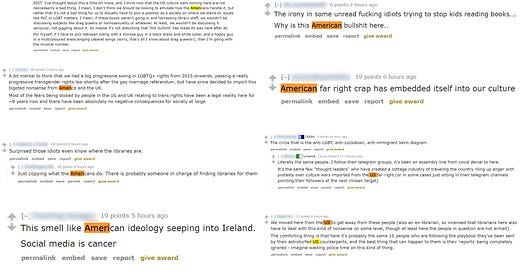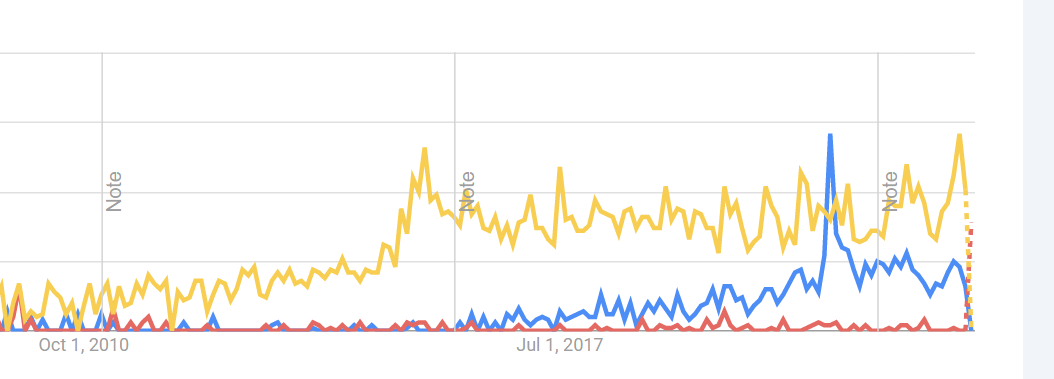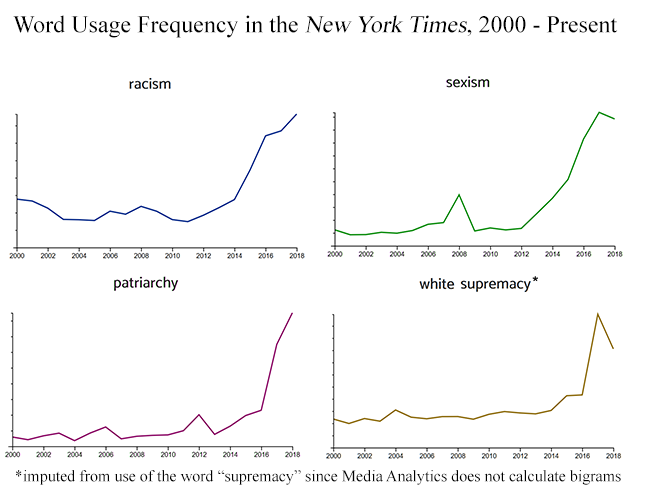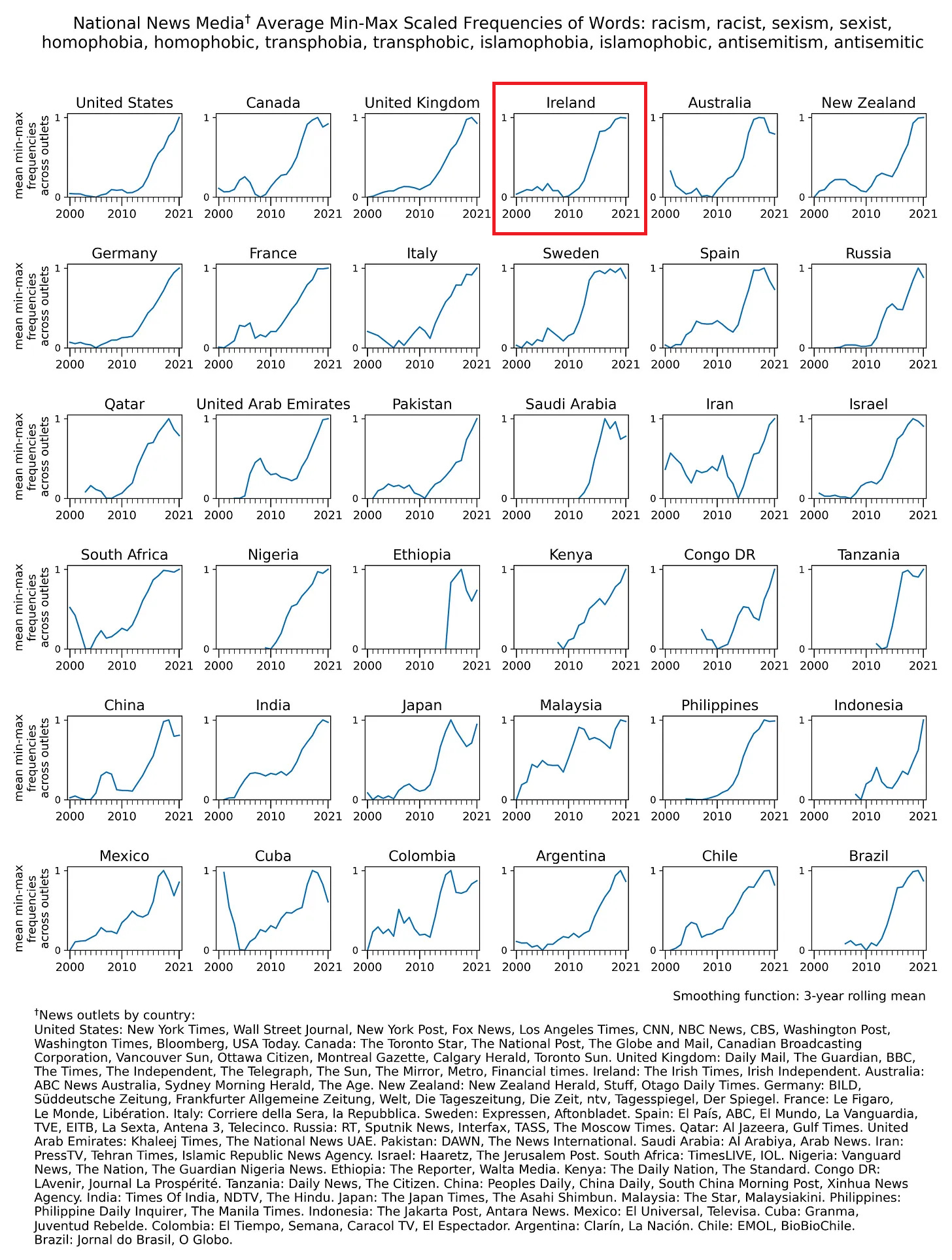American cultural exports
How can you say to your brother, "Let me take the groomer panic out of your eye", when all the time there's a #BLM hashtag in your own eye?
Seen on the r/ireland subreddit: Libraries issued with instructions for securing buildings as protesters try to remove LGTBQ+ books for young people. I don’t really have much to say about the article itself: it’s quite even-handed and avoids direct editorialising (although it isn’t hard to deduce which side of the debate the paper takes, given that the article concludes with the cover artwork and synopses of three of the books being targeted). While I have specific misgivings about LGBTQ activism in Ireland, I think that calling the guards on a library because it’s carrying a YA novel featuring a gay couple is a hysterical overreaction. I agree with pretty much everyone that, if you’re concerned about your child being exposed to content you find unseemly or distasteful, the most effective solution is to simply not buy them a smartphone.
What I want to talk about is the comments on the article on Reddit. The commenters are united in the contempt in which they hold these activists, which is hardly surprising, but cast your eye over them and you’ll notice another recurring theme:
The consensus seems to be that these activists have simply imported their concerns, opinions and tactics from the United States, via American social media. I mean, I don’t disagree - they have. Were it not for the influence of social media, it would never have occurred to any of these activists to set foot in a library hunting for “objectionable” YA books. But this phenomenon is not peculiar to them. One commenter comes a lot closer to the mark:
I have a simple question: before Facebook was introduced to Ireland (December 11, 2005), did you ever hear of an Irish teenager describing themselves as “non-binary”?
Perhaps you’ll say that there were always non-binary people in Ireland, and access to social media just succeeded in “raising awareness” of a phenomenon which has always existed since the dawn of time. I don’t buy it. When I was in secondary school, there were openly gay, lesbian and bisexual students; there was not a single one who called themselves non-binary. The Enoch Burke saga is rather farcical and something of a storm in a teacup, but amidst all the thousands of column inches expended on journalists wringing their hands about a teacher refusing to address a student by they/them pronouns, very few that I’ve seen have asked the obvious question - why does the student in question want to be addressed by they/them pronouns? How did they arrive at the idea that they would happier being addressed as such?
To return to some examples from an earlier post: is it just coincidence that, of all the protest-worthy events that occurred outside of Ireland in 2020, the only one which prompted protests in Dublin, Galway and Cork was one which took place in the US (the murder of George Floyd)? This isn’t a “whataboutism” thing - I’m not saying “why are people so incensed about the murder of George Floyd when the Uyghurs are literally having their organs harvested on an industrial scale in Xinjiang?” I’m just asking why, of all the objectionable things that happened around the world in 2020 (and there were no shortage), the only one to spark nationwide protests in Ireland was a murder which took place in the US (and during a nationwide lockdown which many of the protesters enthusiastically supported, no less)? Sure, you can say that support for Black Lives Matter is just “common decency” or “being a good person” - but why did so many people in Ireland happen to unite around this one specific US-centric definition of “common decency”? Aren’t you at all curious about that?
Likewise, is it just a coincidence that George Nkencho’s brother described the police officer who killed his brother as a “fed”? That someone organised a “Not My Taoiseach” protest outside Leinster House? That Trinity College conducted a “privilege walk” on campus? That Sally Rooney’s (a Trinity alumnus) novels are stuffed to the gills with self-flagellating recriminations about her characters’ “unearned cultural privilege of whiteness”?
No one talked like this when I was in primary school, or in secondary school. These concepts and the fashion in which they are discussed were imported wholesale from the US, via Facebook, Twitter and Instagram. Every Irish person who spends a sufficient amount of time on American social media inevitably ends up adopting the language, concerns and opinions of one or other side of the American culture war.
I’m pleased to have recently encountered hard data to back up my intuition. You may have seen charts like these before, analysing the frequency with which words like “racism”, “sexism” and “transphobia” appear in the New York Times:
About a month ago, David Rozado published a similar analysis on media outlets outside of the US, conclusively demonstrating that the so-called “Great Awokening” is not confined to the US. And wouldn’t you know it:
Again, I just have to ask the obvious question. Around 2013-4, American left-leaning journalists became fixated on identity politics, resulting in a massive spike in the rate at which they used words like “racism”, “white supremacy”, “transphobia” and so on. Almost immediately, journalists writing for the Times and the Independent started doing exactly the same thing. Is this a coincidence? Did the “awokening” in US news media cause Irish journalists to view their culture in a different light, making them aware of important issues like racism, sexism and transphobia to which they’d been thitherto ignorant (the interpretation of the woke themselves would presumably endorse)?
Or is it conceivable that, as I’ve repeatedly argued, Irish journalists spend so much time on American social media and consuming American journalism that they’ve subconsciously come to believe that they actually live in the US, or that the issues which are important in the US must by necessity also be important in Ireland? That they’ve simply ported this worldview wholesale from one operating system to another, and are straining mightily to ignore or explain away the bugs and glitches that inevitably result from doing so without iterating on it or conducting any QA testing?
It’s a real “fish don’t notice the water they swim in” situation. Left-leaning Irish urbanites (including journalists) are so steeped in the modern culture war that they don’t realise their progressive opinions are just as much of an American cultural export as the conservative reactions to those opinions.
And look: this isn’t to say that the woke worldview is wrong - the fact that it originated in the US and was imported into Ireland has no bearing on whether or not it’s true or ethically sound. It will come as no surprise to you that I think it’s fundamentally flawed in many aspects both descriptive and normative, but I welcome disagreement on this point. I would hope that Irish people who are themselves woke might at least grudgingly concede that the woke worldview was invented in a specific country with a specific culture and history, and hence can’t be assumed to be equally relevant or applicable in other countries with different cultures and histories.
But please: at least have the self-awareness to recognise that, while the Irish people harassing librarians about “grooming” did not arrive at their worldview entirely independently, neither did you. You absorbed it through cultural osmosis: by spending time on social media networks which have an obvious American slant (by virtue of having been founded there); by consuming American films, TV shows and journalism; by working for US-based multinationals like Facebook, Pfizer or JP Morgan, for whom the culture and worldview of the upper management is bound to trickle down to their overseas outposts; by completing woke-influenced Arts courses in UCD or TCD (this stuff started in the academe before spreading out into the wider world). Your thoughts, beliefs, opinions, even vocabulary are not entirely your own. (Nor are mine, obviously.)
“Pfft, those right-wingers get all their opinions from Americans on Twitter!” scoffs the “aromantic genderfluid” Redditor who has their pronouns in their email signature, shares black squares on Instagram and complains about how “toxic” and “problematic” their parents are.
Physician, heal thyself!











American here. I still assert that "Black Lives Matter Sinn Fein" (sic) is the funniest thing I've ever seen in politics.
Hi! I'm a US citizen who is late to this party, and also who has lived in another country (on a very small Caribbean island) for over 10 years now. I have noticed the same thing here with adoption of American phrases, but with the twist that the phrases aren't being used for the same thing that Americans use them to mean.
So for instance, "toxic masculinity" became popular here shortly after it became popular in social media and media generally in the USA. But American "toxic masculinity" refers to, I think, a guy at work interrupting female coworkers and being bad at expressing his feelings or something. Here, "toxic masculinity" means something more like a very violent, physically abusive and unfaithful boyfriend. Very occasionally there will be a conversation between an American and a local where the same words are being used, and in the course of the conversation they uncover that they're talking about very different things. But usually, word usage just runs in parallel, with neither speaker apparently being cognizant of each other's different meanings.
I wonder if the international figures of phrase usage you show might hide distinctions like these, as very few cultures are as, ahem, "woke" as US culture is, even if they're using the same American words. In America, "anti-trans" means using the wrong pronouns; in Jamaica, it means someone getting beaten to death. So an article about anti-trans attitudes published in Jamaica might look like it's about the same thing as an American article, but it definitely is not.